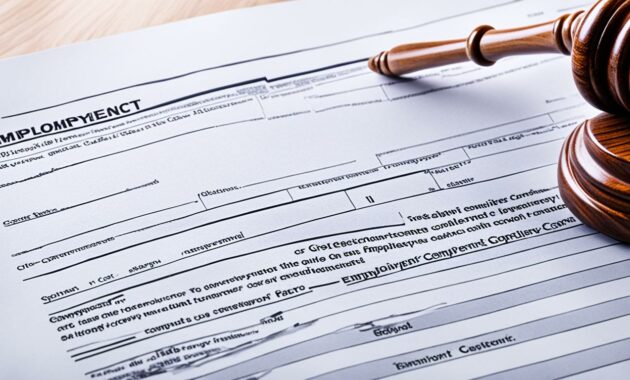If you’ve lost your job suddenly, you might want to fight back. In the U.S., work is typically “at-will.” This means bosses can let employees go for any reason that’s legal. But, not all cases are the same. There are times you might stand a chance to either keep your job or get some justice through a legal process.
Losing your job out of the blue can really hurt you financially. And it might affect what happens next in your career. If you think your boss fired you for the wrong or bad reasons, you’re likely a victim of wrongful termination. A lawyer who knows about this kind of law can guide you. They’ll help see if you have a strong reason to take legal action against your former employer.
Understanding Employment At-Will and Exceptions
In the United States, many states follow the idea of “employment at-will.” This means employers can let employees go for any reason not breaking the law. But, some situations allow employees to fight an unfair firing.
Written Promises and Contracts
A written promise of job security can help fight at-will employment. This includes any official documents saying the job is secure. An unspoken agreement due to the employer’s behavior might also count.
Implied Promises and Good Faith Dealing
How long someone works there and any promotions can shape things. If an employer doesn’t treat someone fairly, it could be a problem. This includes lying about chances to move up or their reason for letting someone go.
In places like California, without a specific job contract, employment is often “at will.” That means a boss can fire someone at any time, even suddenly. Yet, there are times when getting fired might be wrong. This could happen if the firing goes against fairness or public policy.
It’s key to gather documents like contracts and performance reviews if you feel fired unfairly. Consult an employment lawyer to see if you have a case. They can help you figure out if you deserve fairness after being let go.
Wrongful Termination Based on Discrimination
The U.S. sees a lot of workplace discrimination cases still. Laws say companies can’t fire you because of things like your race, gender, or religion. They also can’t fire you for being pregnant, having a disability, or your age.
Protected Characteristics and Discriminatory Firing
If you think you got fired because of discriminatory reasons, don’t wait. You have to act fast. There are important rules and a limited time to file a complaint. This is necessary if you want to fight back and possibly sue your employer for wrongful termination.
- In Texas, you have up to 180 days after getting fired to file a complaint.
- State laws in Texas protect you from being fired for reasons like your race, gender, age, or because you’re disabled.
- You can take legal action if you’re fired for these illegal reasons or for breaking other work-related rules.
Showing you were a victim of workplace discrimination or discriminatory firing can be tough. The employee often has to prove it. But, with a solid plan and evidence, you might get paid for things like lost wages or the way the situation affected you emotionally. You might even get extra money to punish the employer.
To back up your claim in court, you must have evidence. This can include things like biased statements, your work performance reviews, and what others saw and heard. Anything that points to your employer having a bad track record with discriminatory behavior helps.
“Choosing the right attorney specializing in employment law and with experience in wrongful termination cases is crucial for a successful lawsuit.”
Remember, even if your state treats jobs as “at-will”, your employer still can’t fire you for illegal reasons. This includes firing you due to discrimination or because you spoke up against something wrong. If you feel your firing was not right, consider talking to a lawyer who knows about employment laws. They can tell you about your options and how to protect your rights.
Retaliation and Whistleblower Protection
Employers cannot punish workers for doing certain legal things. These include filing a complaint with the Equal Employment Opportunity Commission or reporting harassment/discrimination directly to the employer. You need to prove you were engaged in a protected activity, it caused harm from the employer, and you were indeed harmed.
Whistleblower laws protect those who speak up about illegal or bad activities in their workplace. They make sure these employees are safe from things like retaliation, workplace retaliation, or unfair termination.
| Law | Protections | Enforcing Agency |
|---|---|---|
| Occupational Safety and Health Act (OSHA) | Ensures safe working conditions by setting and enforcing standards | Occupational Safety and Health Administration (OSHA) |
| Mine Safety and Health Act (MSHA) | Reduces deaths, injuries, and illnesses in mines through safety regulations | Mine Safety and Health Administration (MSHA) |
| Executive Order 11246 | Enforces laws promoting diversity and fair employment practices for federal contractors | Office of Federal Contract Compliance Programs (OFCCP) |
| Fair Labor Standards Act (FLSA) | Enforces labor standards like minimum wage, overtime pay, and child labor laws | Wage and Hour Division (WHD) |
| Uniformed Services Employment and Reemployment Rights Act (USERRA) | Protects service members’ reemployment rights and prohibits discrimination based on military service | Veterans’ Employment and Training Service (VETS) |
These agencies are key in making sure whistleblower and anti-retaliation laws are followed. They protect employees reporting violations or engaging in safe activities from facing bad consequences.
“Employers cannot retaliate against employees for exercising their rights under whistleblower protection laws.”
The proof to show retaliation or whistleblower protection wrongs is on the employee. They must show their legal actions were directly linked to the bad stuff that happened to them at work.
Learning about these laws helps employees handle workplace retaliation. This way, workers can speak up about wrongs without being afraid of what might happen to them.
Can I Sue For Being Fired Without Warning?
Many folks worry about their rights if they’re let go without a heads-up. In California, the law says employers can let staff go for any reason, thanks to the at-will work rule. But, certain situations could give you a shot at a legal case against this rule. This is called a wrongful termination lawsuit.
Proving Wrongful Termination
Proving a firing was wrong in California means showing it broke a work agreement, public rules, or anti-discrimination laws. For instance, being let go for speaking against illegal stuff or asking for help because of a disability could be wrong.
Under the California Fair Employment and Housing Act (FEHA), you can sue if you were fired because of who you are. This includes your race, age, sex, gender, pregnancy, disability, religion, or sexual orientation. The state’s Labor Code also helps if you lose your job for standing up against your boss’s illegal actions.
Documenting Evidence and Witness Statements
Collecting facts is key if you think you were wronged in California. Keep all work papers, contracts, reviews, and emails handy. If others saw what happened, getting their statements can support your case.
Getting help from a specialist lawyer is crucial. They know the laws and can guide you. This is important because you have only a limited time to file a case.

In California, you can take action even with the at-will rule, if your rights were stepped on. Keeping records and getting legal advice are critical. They help protect your rights and boost your chances of winning a wrongful termination case.
Breach of Contract and Violation of Policies
Wrongful termination means a job loss that breaks the rules. Looking at your job contract and company rules is key. A contract that talks about keeping your job safe, or how to leave a job, can help a lot in court. Even without a clear contract, promises from your boss can matter too.
Checking your handbook is just as important. It shows how the company should act. If getting fired doesn’t match what’s in the handbook, you might have a good case against them.
Reviewing Employment Contracts and Handbooks
Reading your work contract and handbook closely can find important info. See if they promise to keep you working, explain how they can let you go, or say they need a good reason to do so. If they fire you in a way that breaks these rules, you might have a reason to sue.
- Examine your employment contract for written promises of job security or termination procedures
- Analyze your employee handbook for policies that may have been violated during your termination
- Identify any implied promises made by your employer through their actions or statements
- Determine if your termination contradicted the guidelines set forth in your employment documents
Understanding these documents can help you know your rights. It’s also wise to talk to a lawyer who knows employment law. They can guide you through making your case.
| Breach of Contract Statistics | Violation of Employee Handbook Statistics |
|---|---|
| – Around 15% of wrongful termination cases involve a breach of an employment contract1 | – Up to 30% of wrongful termination claims cite a violation of company policies2 |
| – Employees with written employment contracts have a higher likelihood of successful wrongful termination lawsuits1 | – Employers who fail to consistently apply their own policies are more vulnerable to wrongful termination lawsuits2 |
| – The average settlement for a breach of contract claim in a wrongful termination case is around $80,0001 | – Successful claims based on policy violations can result in awards of back pay, reinstatement, and other damages2 |
Knowing your work agreements and rules can protect you. If you think you were fired wrong, these documents are important. They might help you challenge the firing.
“Employers must be held accountable when they disregard their own policies and procedures, as well as the terms of any employment agreements. Employees deserve to have their rights protected.”
– Employment Law Attorney, Jane Doe
Wrongful Termination Due to Fraud or Defamation
Sometimes, when an employer fires someone, their actions can be serious. They might reach the level of fraud. To prove fraud, you need to show certain things. You must prove your boss lied, knew they were lying, meant to trick you, and that you were hurt. If your boss said bad, false things about you after you left, that’s defamation. You win by proving these lies actually hurt your job search.
Proving these things is not easy. Defamation cases need a lot of proof. The false thing must have been said, it must be harmful, and it can’t be privileged. This means, things said in private at work might be protected. But, if those things are lies and hurt your reputation, you might have a case.
Employers can’t lie or say bad things about you in a mean way when they fire you. If you can show they did and you were fired wrongfully, you could sue. You might get money for what you lost in wages and your harmed reputation.
| Wrongful Termination Grounds | Examples |
|---|---|
| Fraud | Employer makes false representation, knows it is false, intends to deceive employee, and employee is harmed |
| Defamation | Employer makes false and malicious statements about employee that harm their chances of finding a new job |
If you think you’ve been wrongly fired because of someone saying false things or lying, get a lawyer. A good lawyer can check out your situation. They can help you get the fairness and money you deserve.

“Over 40 years of combined experience in handling wrongful termination cases.”
The team at [law firm name] has helped many people over four decades. They fight for workers unfairly fired. Let them help you get what you’re rightfully owed.
Filing a Claim with Regulatory Agencies
Do you think you were fired because of protected reasons? You might have a case to bring to the EEOC. The EEOC checks into workplace discrimination. If they see your case has weight, they might let you sue. Talking to a lawyer who knows about these issues can help you figure out how to file with the EEOC or other groups.
Equal Employment Opportunity Commission (EEOC)
The EEOC is a big player in stopping job discrimination. It checks if you were let go due to race, color, religion, sex, and others. You need to tell the EEOC within 180 days of the bad event, or 300 days if your state allows this.
The EEOC looks into your complaint to check if it’s real. If they agree, they might work with your old boss to fix things. But if this doesn’t work, they can give you a letter that lets you sue them.
- The EEOC looks into discrimination at work because of special reasons.
- You have 180 days, or 300 days in some states, to tell the EEOC about the problem.
- They will look into your case to see if it’s true.
- If the EEOC thinks you’re right, they might try to help you settle with your employer.
Working with the EEOC can be hard to do on your own. It’s smart to talk with a lawyer who knows how these cases work. They can aid you in knowing your rights and what to do next.
Consulting an Experienced Wrongful Termination Attorney
Dealing with possible wrongful termination? It’s key to know your rights and the law options. Talking to a skilled wrongful termination attorney is very helpful. They can offer vital advice, understand the job law’s twists and turns, and help you make a strong argument.
Quality wrongful termination attorneys usually have a first meeting for free. This lets you talk about what happened and see if you can win. They use their know-how to check your case’s strengths, suggest the best legal moves, and stand up for you if needed.
Hiring a savvy wrongful termination lawyer can really up your winning chances. They help with important stuff like finding proof, making your case solid, and keeping your rights secure. By getting advice from a pro, facing job law’s tough stuff becomes easier. This boosts your shot at a good outcome.

